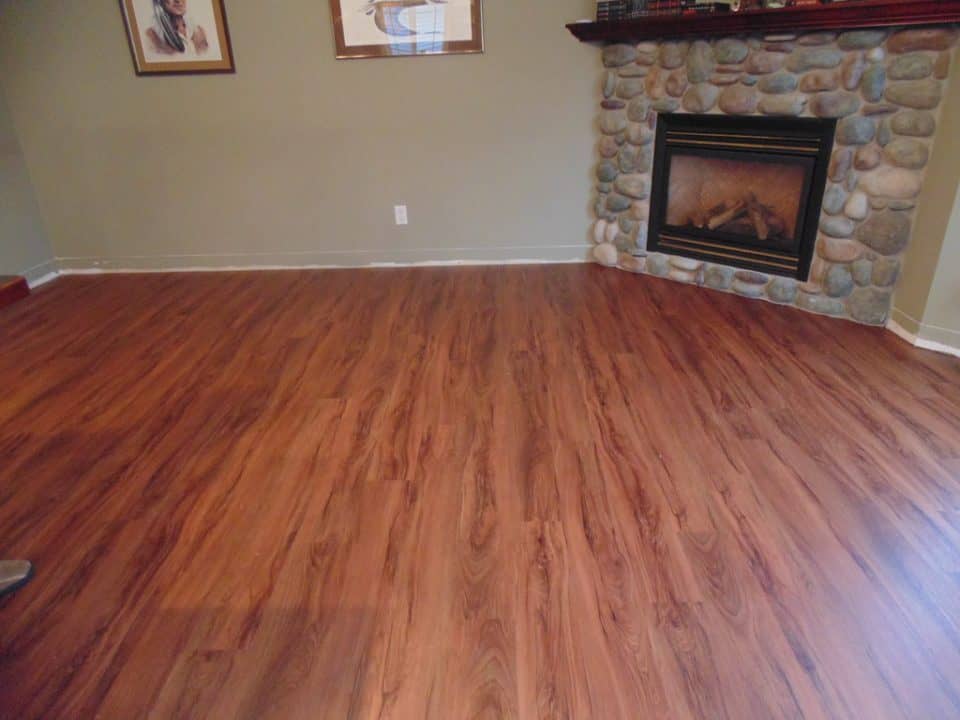Vinyl plank flooring offers a wealth of benefits. Nevertheless, there is always a risk that something is going to go awry in the future.
After all, this type of flooring doesn’t stand up well in certain environments. This is something you have to be worried about.
After all, vinyl plank flooring will expand or shrink based on the temperature that it is exposed to. Unlike some of the alternatives, it will expand when it gets hot and shrink when it is exposed to cold temperatures.
At the same time, you have to be worried about the warranty. There are many companies that place stipulations in their warranty.
It may say something about the temperature needing to remain between 65 and 85 degrees. If you use the flooring in temperature below this, your warranty might be voided.
Below, you’ll learn more about using vinyl plank flooring in extremely cold environments.
Are Thermal Underlays Perfect For Vinyl Floors?
Vinyl plank flooring and cold temperatures do not go hand in hand.
Therefore, you have to be careful. There is always a risk that the cold weather is going to cause problems.
Can you offset these problems by using a thermal underlay?
Unfortunately, there isn’t a definite answer here. You have to find out what is going to work best for you. You also have to consider the sub-floor or the floor that is underneath the vinyl.
The floor underneath needs to be in good condition. It shouldn’t be damaged and it must be smooth.
You’ll also need to clean it thoroughly.
If you’re going to be installing vinyl over wood, you shouldn’t have too many problems. You probably won’t need an under-layer. However, you might if you want to add cushioning and reduce sound. It might also be required by your Home Owner’s Association or Condo Association.
It is generally a good idea to use a thermal underlay on concrete floors. This will ensure that the floor is a little softer. In return, you’ll have an easier time walking on it. This will also help reduce moisture.
Finally, the under-layer will help keep the floor warmer during the colder months. Suffice to say, a thermal underlay is indeed a good option for vinyl floors.
However, it may not be necessary.
Is Installing Carpet A Good Option?
Ultimately, you may feel that vinyl plank flooring your not your best option.
Instead, you might be on the hunt for something that will work better in colder conditions.
Carpeting is a decent choice for several reasons. First and foremost, carpet doesn’t expand or contract too much. Therefore, it will not be impacted by the temperatures too much. You won’t have to worry about the carpet warping or anything like that.
However, carpet has a few problems of its own. For instance, you always have to worry about tracking ice and snow inside. Sadly, carpet can absorb a lot of moisture. What is going to happen if you walk through the snow and step inside of your home? You’re going to be in a hurry because you want to get out of the cold as quickly as possible. In all likelihood, you’ll be carrying snow and ice in with you.
This is especially true if you take part in snow activities during the winter. During the winter me and my family love playing about in the snow by our cabin and it’s a good thing we don’t have carpet as it’d get soaked every time we return from our fun.
Once the snow meets the warm temperatures in your home, it is going to melt. In return, the carpet will end up soaking up the water. If you do not act quickly, the moisture may damage the flooring underneath the carpet. This is the biggest problem with carpet.
Nevertheless, it is arguable that carpet is still a better option than vinyl plank flooring. After all, it isn’t going to expand or contract when the temperature changes.
What Flooring Is Best For Cold Temperatures?
Ultimately, you have plenty of options at your disposal. Nevertheless, you should realize that not all flooring types are going to be suitable for colder climates.
Carpet is a good choice. It will remain warm and protect your feet from the cold temperatures. However, you have to be worried about the moisture. If you live in an area that receives a lot of snow or rain, you’ll probably want to choose something else.
After all, the carpet will get wet and that could cause damage to the wood underneath it. You’ll also need to take special care to keep your carpets clean.
Vinyl plank flooring is a decent option. This type of flooring is waterproof and very durable. It also does good in terms of insulating the floor. However, there is a chance that it is going to expand and contract.
If you’re going to choose vinyl plank flooring, you will need to spend more to add a thermal under-layer too. This will make the installation process slightly tougher and more expensive. Still, this might be your best option.
Rubber is worth considering too. After all, rubber is one of the most durable flooring types. On top of that, you can guarantee that it isn’t going to shrink or grow when exposed to hot or cold temperatures. It is mostly waterproof too.
The only downside here is that rubber flooring doesn’t look great. It isn’t as stylish as some of the alternatives.
Finally, you can always use slate or granite tiles.
Ceramic and porcelain would be terrible choices. They’re not going to be able to stand up to the cold weather. Slate and granite will be able to do just that. However, you will need to use an underfloor heater. Either way, this is a good option for those who want style and durability.
Conclusion
I’ve created an article on the best flooring for extreme temperature changes. So if you’re in a location where the weather experiences violent changes then you may want to check it out. You can find it by Clicking Here.
At the end of the day, vinyl plank flooring is a good choice for cold temperatures. However, you’ll need to take some precautions.
Using a thermal underlay is a good choice. This will help keep the floor warm and that may prevent it from expanding or contracting too much. This will also keep your feet warm during those cold winter months.
Nevertheless, vinyl plank flooring might not be the best flooring for cold temperatures. Carpet isn’t either.
Take the time to consider all of your options before making your final decision.
My name is Eugene Thornhill. I'm an outdoor enthusiast who loves nothing more than being one with nature. I've lived in numerous outdoor homes and even constructed my own. Living off-grid is something I'm very familiar with, more so than living in the city. For many years I've dealt with the many problems of living off-grid. It's time to pass on my knowledge through Cabinguides.


